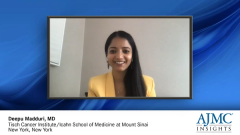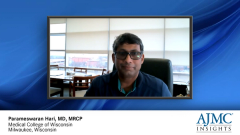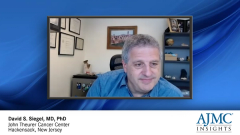
CAR T-Cell Therapy in RRMM: Recent Data
An overview of the most recent clinical trial data available for the use of CAR T-cell therapy in relapsed/refractory multiple myeloma, as presented on at the 2020 ASH annual meeting.
Episodes in this series

Parameswaran Hari, MD, MRCP: These are 2 CAR [chimeric antigen receptor] T-cell therapies that are BCMA-directed, specifically ide-cel [idecabtagene vicleucel]and orva-cel [orvacabtagene autoleucel]. The clinical data for orva-cel [orvacabtagene autoleucel] was presented at ASCO [the American Society of Clinical Oncology annual meeting] 2020. Comparatively, the clinical data for ide-cel [idecabtagene vicleucel] was presented based on the first phase 1 study, which was known as the CRB-401 study, with a recent update presented at ASH [the American Society of Hematology annual meeting] 2020.
The data for both agents are in line with what we would expect in terms of the other BCMA CAR T cells that are in play. Orva-cel [orvacabtagene autoleucel]is a BCMA-directed CAR T that produces a highly purified product and a product that is supposed to have a higher proportion of memory cells. Memory cells, when they become CAR T cells, can proliferate rapidly in the patient while sustaining their presence over time.
The data for orva-cel [orvacabtagene autoleucel], the number of CAR T cells remaining in the patient’s body at 6 months, for example, or the area under the curve for the CAR T expansion and proliferation, look exceptionally good within the pre-clinical aspect. Regarding the clinical aspect, 90% and above of patients getting orva-cel [orvacabtagene autoleucel] had a rapid, deep reduction and established complete remissions and minimal residual disease [MRD] negative remissions. However, those results consist of limited data, with a limited number of patients having been treated as the study is still ongoing. A second study known as JCARH125 with orva-cel [orvacabtagene autoleucel] is ongoing. Notably, that JCARH125 study also was presented at ASH with no clinical outcomes, just the ongoing study itself was announced there.
Regarding ide-cel [idecabtagene vicleucel], I found the long-term data from CRB-401 presented at ASH to be exciting. We know that multiple doses were compared in this study, and the last 2 dose comparisons, consisting of 450 million and 800 million cell doses, turned out to be the most effective. However, even when you look at those patients, we saw that the median progression-free survival [PFS] was in the order of 10 to 12 months, depending on the dose that the patient got. The overall survival [OS] is much more than that, specifically another 2 years more. Regarding the point I made earlier, this suggests that patients receiving a break from all therapy and the constitution of their immune system following CAR T may enjoy a long survival over and above what is induced by the CAR T.
Deepu Madduri, MD: The CARTITUDE-1 trial looks at ciltacabtagene autoleucel, or cilta-cel, a chimeric antigen receptor T-cell therapy with 2 BCMA binding domains. At ASH 2020, we presented the combined phase 1b/2 results of CARTITUDE-1.
There was a total of 97 patients treated with cilta-cel [ciltacabtagene autoleucel] with the combined study, with a median age of 61 years, while a little more than half were male. These patients were heavily pretreated as their median prior lines of therapy was 6, and it ranged anywhere from 3 to 18. Eighty-eight percent of these patients were triple-class refractory, and 42% were penta-refractory. Interestingly, 99% of these patients were also refractory to their last line of therapy. Typically for CAR T, the 2 toxicities you really are worried about are cytokine release syndrome [CRS] and neurotoxicities.
All but 5 patients had CRS, with most of it being grade 1 and 2. Another interesting aspect of cilta-cel [ciltacabtagene autoleucel] is that the median time of onset of CRS is about 7 days, with 89% of the patients having CRS at day 4 or later, and 74% of these patients having CRS at day 6 or later. Various supportive measures were used to treat CRS, with the most common being tocilizumab and corticosteroids.
With CAR T-cell therapy, another common complication we usually see is neurotoxicity. The total CAR T-cell neurotoxicity of any grade was 21%, with grade 3 or higher being about 10%.
The overall response rate was 97%, with 67% stringent CR [complete response], and 93% of these patients having VGPR [very good partial response] or better. We saw how heavily pretreated these patients were, and to see a one-time treatment that can give these kinds of response rates is quite exceptional. What’s even more impressive is that 72% of these patients are still maintaining their response at the time of data cutoff.
We also know that, based on the MAMMOTH study, patients with relapsed/refractory myeloma have a median OS of less than 9.2 months if they’re triple-refractory, and only 5.6 months if they’re penta-refractory.
In this study, we saw that the median PFS is at least a full year, and we still haven’t even reached a median PFS, after a median duration of follow-up of 12.4 months. We also saw, when we broke down the PFS by response, a 12-month PFS in patients who achieved CR or better, with 85%, and then the 12-month PFS in patients with VGPR was 68%. Once again, the median PFS was not reached in either group, while neither was the 12-month OS.
Cilta-cel [ciltacabtagene autoleucel] has a manageable safety profile at the recommended phase 2 dose, with 95% of the patients having mostly grade 1 and 2 CRS. Neurotoxicity of any grade was seen in about 21% of the patients, with grade 3 or higher being only 10%. We did see early, deep, and durable responses observed in this heavily pretreated population, with an overall response rate of 97%, with stringent CR rates at 67%, and at the time of data cutoff, the median 12-month PFS was not reached.
In conclusion, cilta-cel [ciltacabtagene autoleucel] is being investigated in earlier-line settings and as an outpatient administration in the CARTITUDE-2 and CARTITUDE-4 studies.
Newsletter
Stay ahead of policy, cost, and value—subscribe to AJMC for expert insights at the intersection of clinical care and health economics.







